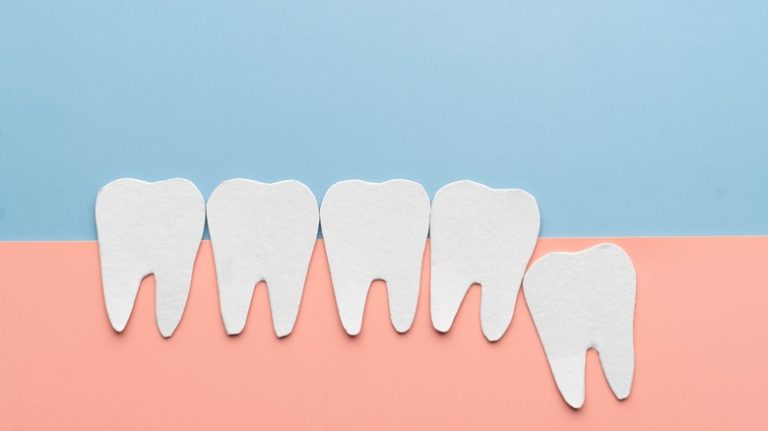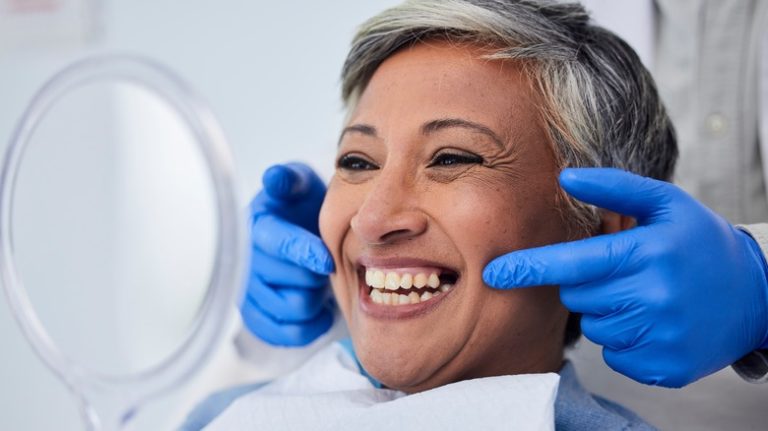Brushing your teeth is necessary for a healthy mouth, but tooth be told, you’re probably making a ton of mistakes that are actually hurting your teeth and gums as opposed to helping.
There are a lot of variables at play — from the motions you make to what time of day you decide to brush your chompers to the kind of toothpaste you apply to your toothbrush — that can either improve or worsen your oral health. Luckily, there are some easy fixes that are sure to bring a smile to your face — and have it filled with shiny, white teeth too. In fact, some of the best solutions are actually much simpler than you may realize.
So how exactly could you possibly be ruining your pearly whites? Here to impart some wisdom (teeth) onto you, Health Digest discovered the mistakes everyone makes when brushing their teeth — and all the many ways you can rectify them.
Forgetting to replace your toothbrush frequently
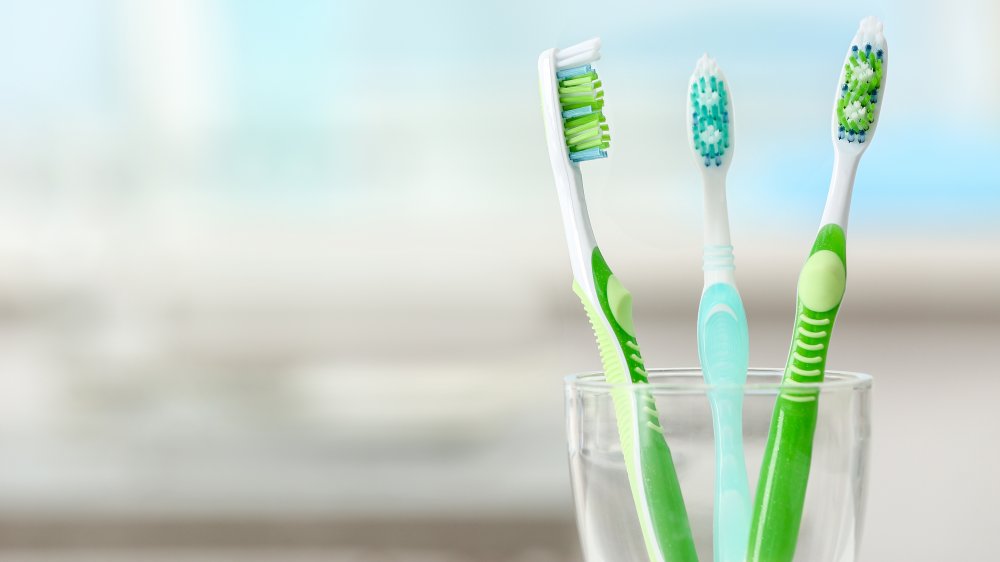
When was the last time you tossed your toothbrush? Don’t remember? Well, get to it. While we depend on our toothbrush to keep our teeth clean, many of us forget we have to keep our toothbrushes tidy too. According to the Centers for Disease Control and Prevention, toothbrushes should be replaced every three to four months or earlier if the bristles appear visibly worn. “Bacteria from your mouth and bathroom can accumulate on your toothbrush over time,” Nehi Ogbevoen, a California-based orthodontist, explained to Aquafresh. Over time, the bristles can become flattened and not clean as effectively too, leaving you with a cavity (via Oral-B).
If you catch a cold, it’s best to toss out the brush once you’ve recovered — even if you haven’t hit the recommended three-month mark. While it’s not likely that your toothbrush will reinfect you, the bacteria can combine with others on the bristles and cause you to come down with something else. “There are so many bacteria that can reside on a toothbrush; therefore, it is always best to get rid of it once you have been infected with some sort of viral or bacterial illness,” medical director Dr. Heathen Rosen recommended to NBC’s Today.
Brushing your teeth right after eating
Turns out, you’re not doing yourself any favors by brushing your teeth immediately after enjoying breakfast. While it may seem to make sense that brushing after eating would be beneficial in removing bacteria, this thinking isn’t entirely accurate. You should, instead, be brushing before breakfast — but why?
By the time you wake up in the morning, the bacteria in your mouth have multiplied. Gross. To get this gunk out, brush your teeth before you sit down for your morning meal. The fluoride found in toothpaste can help protect your teeth against food too.
Breakfast foods are also some of the most acidic, according to Healthline. Sure, it may seem best to brush away your morning OJ right away, but your bristles will actually barrel the acid even further into your enamel. Because of this, the American Dental Association advises waiting a full hour after eating to brush your teeth. If your teeth feel terrible waiting that long, the association recommends just munching on some sugarless gum to get you by.
Only brushing your teeth once a day
Shutterstock
If you feel “one and done” is the best way to go about brushing your teeth, well, we have some news to share. The American Dental Association recommends brushing your pearly whites twice a day instead.
Brushing right before breakfast and again right before bed is the best way to keep bacteria from building up. Over the course of the day — and the night — a sticky coating called plaque sits on your teeth and along your gumline. Eating sugary foods can cause plaque to attack your tooth enamel, and that’s exactly how you can get a cavity.
If this plaque is ignored for a long period of time, this build-up eventually can harden and form tartar. This is what can give you gum disease, according to the Mayo Clinic. So to avoid paying frequent visits to the dentist, brush those chompers twice daily.
Brushing your teeth too quickly
Shutterstock
Unfortunately, many of us aren’t brushing our teeth for nearly as long as we should. Just as with hand washing, there is a magic number when it comes to keeping your teeth the cleanest they can be: Two minutes.
While it’s easy to remember because “two” and “tooth” sound pretty similar, this isn’t why this number has been chosen over our rushed 10-second method. One study published in the International Journal of Dental Hygiene in 2024 found that those who brush their teeth for two minutes remove nearly double the amount of plaque than those who prefer a much quicker method.
It also makes sense to say that focusing on your teeth for a solid two minutes can help you make sure you didn’t miss any areas. So while we could be spending that time treating ourselves in other extravagant ways, treating our teeth for 120 seconds is best. Otherwise, we could be wasting even more time “treating” ourselves to the dentist’s drill. Yikes.
Flossing after brushing your teeth
Shutterstock
Many of us feel proud of ourselves when we follow up a toothbrushing session with some dental floss. Unfortunately, we’ve been going about it wrong all along. While it’s common to brush and then floss, a study published in Oral Health and Preventive Dentistry in 2024 found that flossing before — instead of after — brushing decreased the amount of plaque buildup to a “significant” degree.
When you think about it, the reasoning does make sense. Flossing removes the gross gunk stuck between your teeth and if you’re doing it after brushing, it’s set free to float around in your mouth. Nasty. Brushing after flossing, on the other hand, helps remove all the germs for good, according to Healthline. In fact, flossing does 40 percent of the job when it comes to removing all the bacteria from your mouth. “I tell my patients, ‘I don’t care if you use shoe laces as long as you floss,'” Alla Wheeler, associate professor of the Dental Hygiene Program at NYU’s School of Dentistry, joked to WebMD.
Brushing your teeth too hard
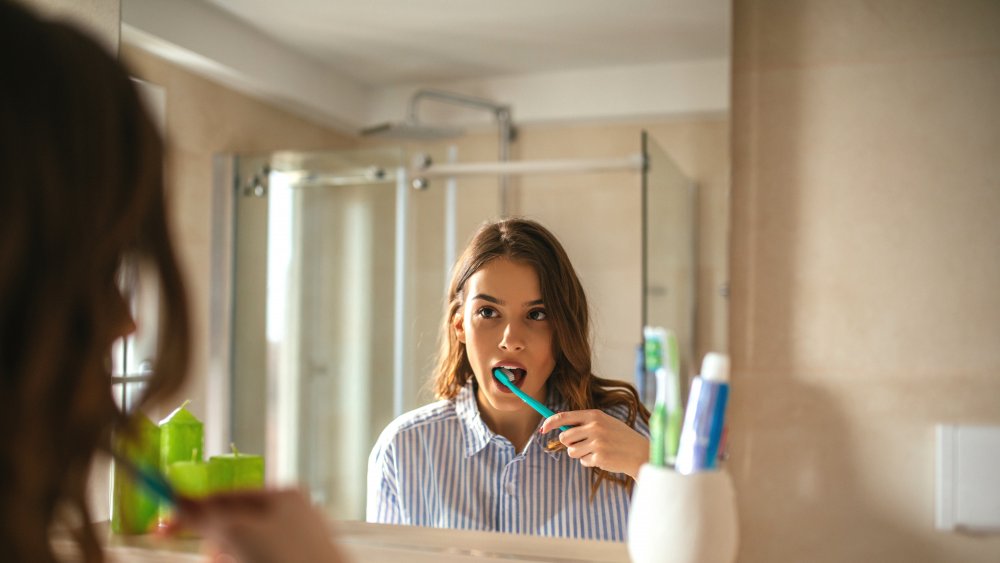
Shutterstock
It may seem that, in order to get your teeth sparkling clean, you’d have to really get in there. However, the harder you scrub, the tougher your teeth troubles may become. “People tend to brush aggressively, thinking it’s the only way they can get their teeth to feel clean and look whiter,” Gene Romo, dentist and consumer advisor for the American Dental Association, explained to Everyday Health. A sure sign of giving your teeth a hard time is flattened bristles.
Our gums are made of sensitive tissue that scrubbing may just screw up. This wear and tear can lead to a receding gumline, and the pressure can even change the look of your pearly whites. “You’re also wearing away the white, glossy enamel on your teeth, making them look yellow and darker,” Romo said. Additionally, brushing too hard can also lead to developing sensitive teeth.
Rinsing your mouth after brushing your teeth
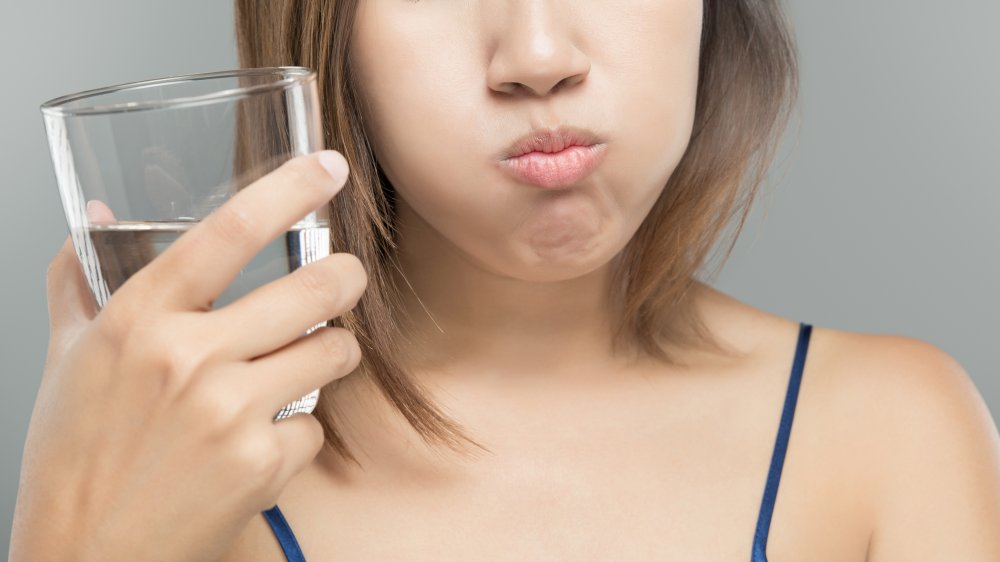
Shutterstock
There’s nothing quite like the feeling of swishing around cold water in your mouth after having just brushed your teeth. However, there’s something wrong with this scenario. Rinsing out your mouth with water after brushing your teeth is actually a big ol’ no-no.
If you wash out your mouth immediately after brushing with toothpaste, you’re rinsing away the reason you’re using the stuff in the first place: the fluoride. “Fluoride is the single-most important ingredient in toothpaste,” the CEO of the Oral Health Foundation, Dr. Nigel Carter, explained. “It greatly helps oral health by strengthening the tooth enamel, making it more resistant to tooth decay. It also reduces the amount of acid that the bacteria on your teeth produce.”
Well, what about mouthwash? That’s actually not a great idea either. “It may also be surprising to some but using mouthwash directly after brushing is also bad for our teeth as it also rinses away fluoride,” Carter continued. While the taste of toothpaste doesn’t get a lot of people excited, that’s exactly what you should be expecting after each time you brush. Yum?
Putting a cap on your toothbrush after brushing your teeth
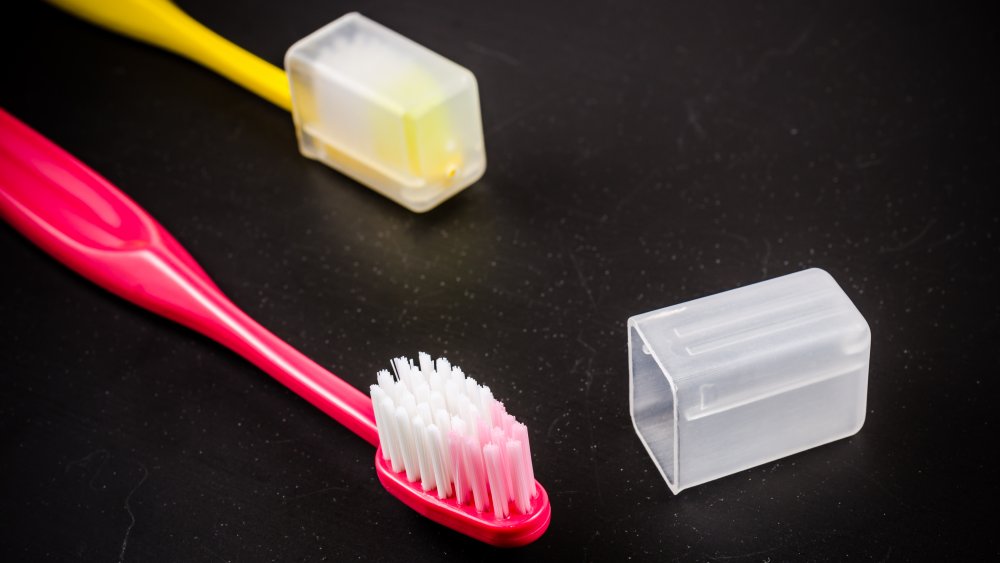
Shutterstock
Leaving your toothbrush out in the open doesn’t seem like the safest spot for something you stick in your mouth, but putting a travel cap over the bristles is even more terrifying. “[It] actually creates an environment where bacteria are better suited to grow by keeping the bristles moist and not allowing the head of the toothbrush to dry out between uses,” graduate student Lauren Aber from Quinnipiac University wrote in her study on toothbrush contamination. In fact, most of the bacteria found on your brush’s bristles are killed instantly by open air, according to Insider.
Because of this, storing your toothbrush in your medicine cabinet isn’t the most sanitary thing either. It keeps your toothbrush sealed tight, and the humid environment contains moisture that can build up on your brush’s bristles, creating the perfect storm for mold and bacteria to grow (via Self).
The safest solution, according to the American Dental Association, is standing your toothbrush upright to be dried by the air around it.
Storing your toothbrush too close to the toilet
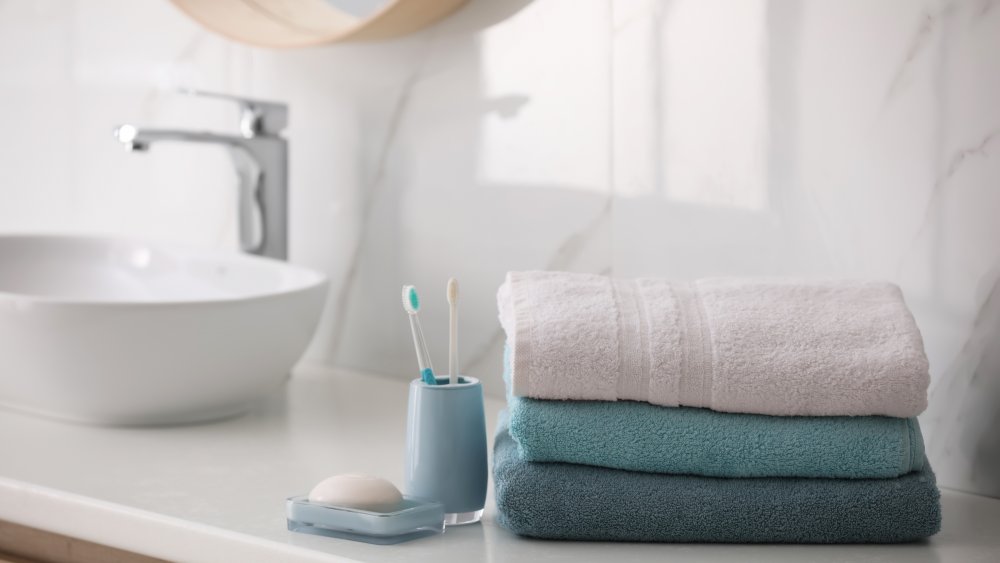
Shutterstock
There’s something even more gross than the food particles and bacteria that get caught between your teeth, and we have to talk about it. It turns out that where you store your toothbrush can have an effect on your mouth. Depending on how close you keep it to the toilet, the bathroom may not actually be the best spot.
The team on the television series Mythbusters set out to see just how much bacteria can be found on your brush after you flush. When they spread toothbrushes out at different heights and distances from their office toilet, every toothbrush in its vicinity was found to have fecal matter on its bristles. It’s quite a disgusting discovery, to say the very least.
While this isn’t likely to make you sick since the amount is so minimal, it’s actually the other people sharing your space that you should be worried about. One study shared with the American Society of Microbiology in 2024 found that 80 percent of the time, this bacteria came from someone else using your bathroom. Now you may be wondering, “Well, where else am I supposed to keep it?” Store it the farthest away from your toilet — and other toothbrushes — as you can.
Brushing your teeth in a back-and-forth motion
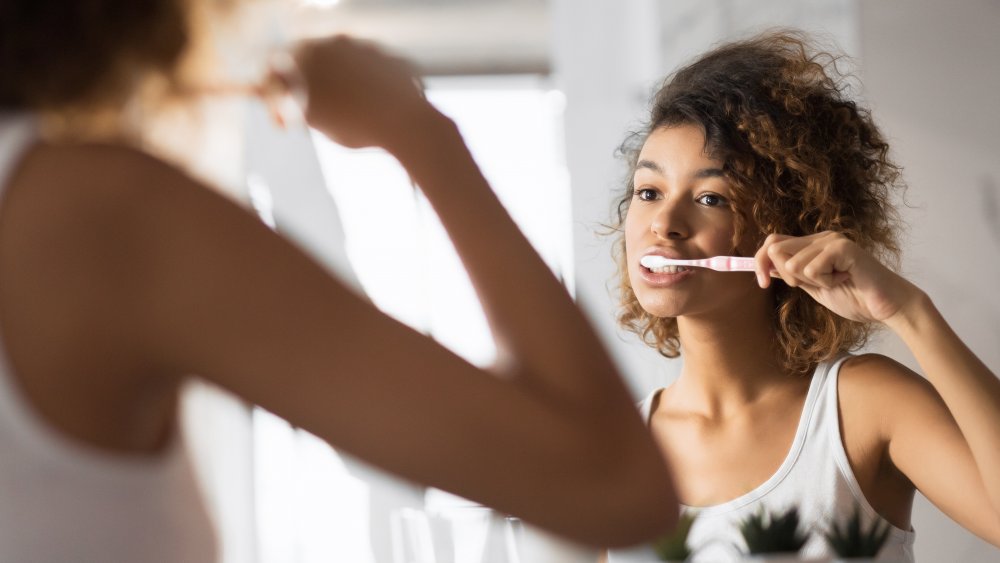
Shutterstock
Up and down, side to side — this monotony may sound familiar if you’re one of the many people who spend minutes each day polishing up their pearly whites. However, this regular routine motion may actually be doing more harm than good. “Using a back-and-forth sawing motion causes the gums to recede and can expose the root of the tooth, making teeth extremely sensitive,” Dr. Robert Roesch of the Academy of General Dentistry warned Everyday Health. Who knew wear and tear on your teeth could be caused by such a simple movement?
To avoid this, angle your toothbrush instead of polishing parallel to your gums. A 45-degree angle is best, and brushing your teeth in a circular motion can give your gums even more of a break. According to the publication, you can continue to use an up-and-down motion only when cleaning the back of your front teeth. Just remember to brush gently!
Skipping your tongue when you brush your teeth
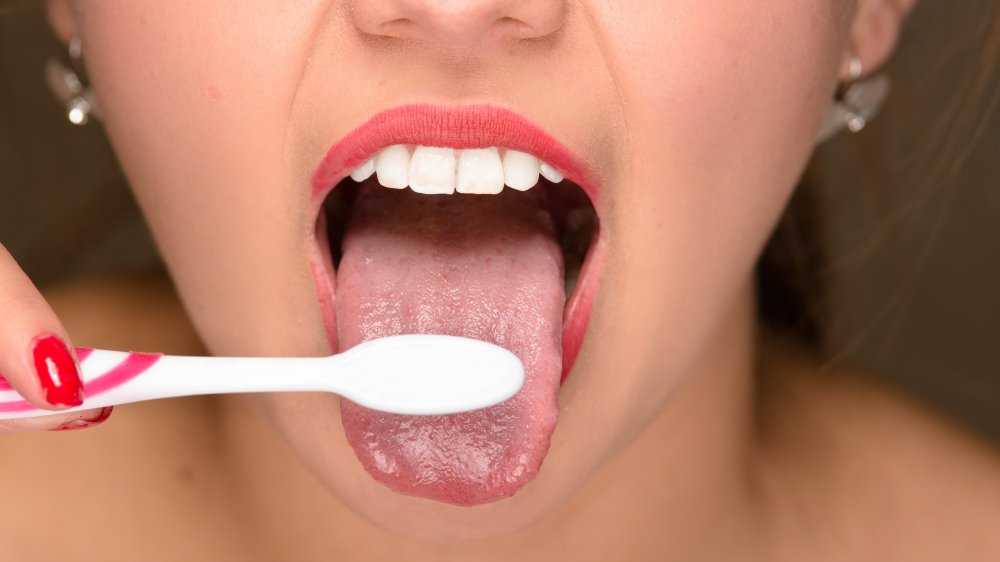
Shutterstock
While we try our hardest to keep our teeth clean, our tongues could be missing out on some serious TLC. This is another very common mistake that everyone seems to make while brushing their teeth. Our tongues — not our teeth — are responsible for tasting things, so keeping it clean is crucial. Abandoning this appendage and letting bacteria build up can lead to bad breath and dulled taste buds.
Unfortunately, things can get a lot more unpleasant than just not being able to taste your morning tea. Germs can spread from your tongue to your teeth and can even cause inflammation in your gums. This painful irritation can make its way into your gum line, leading to something called periodontal disease. Not only can you lose your teeth this way, but periodontal disease can even set you up for a stroke or a heart attack (via Women’s Health). Yikes. If you’re not wanting to tarnish your teeth, heed our warning: Don’t forget the tongue.
Sharing your toothbrush with someone
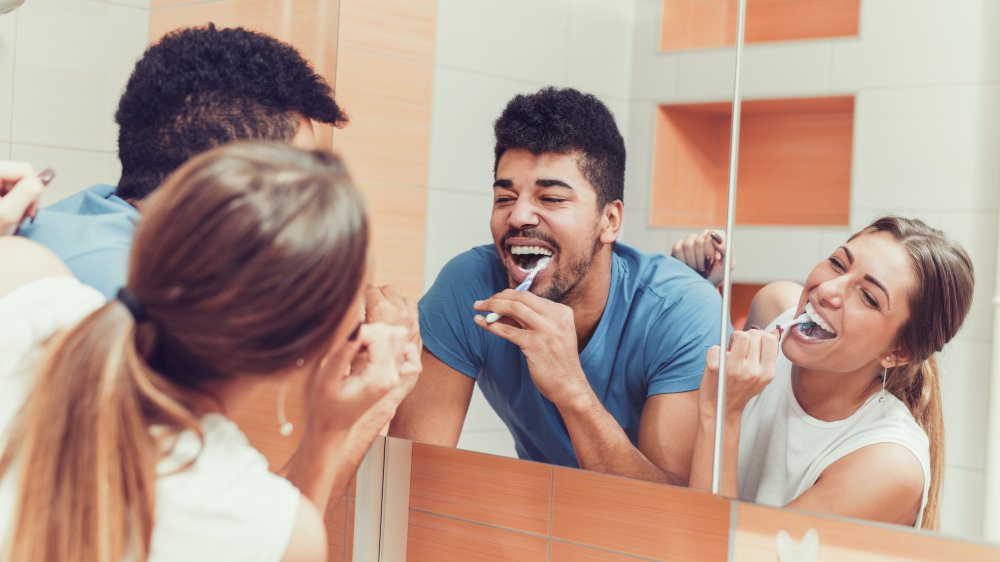
Shutterstock
In addition to sharing a kiss, many couples have admitted to sharing toothbrushes too. In fact, a British survey conducted by the Oral Health Foundation found that more than 25 percent of people do it, but sharing is not caring when it comes to treating your teeth well. This is another massive mistake far too many make.
When you’re brushing your teeth, you’re ridding it of bacteria, yes, but many of those mouth-lurking germs remain on your brush’s bristles long after you’re done. While you may think you’re only swapping spit when you use someone else’s toothbrush, you’re actually sharing a whole lot of bacteria too. “There are many hundreds of different bacteria and viruses in our mouths and people sharing a toothbrush could be passing these on to others,” Dentist Ben Atkins of the Oral Health Foundation explained.
Atkins also explained that “sharing a toothbrush leaves you susceptible to all sorts of oral and general health problems.” So unless you plan on getting sick toothgether, use your own toothbrushes.
Brushing your teeth with certain kinds of toothpaste
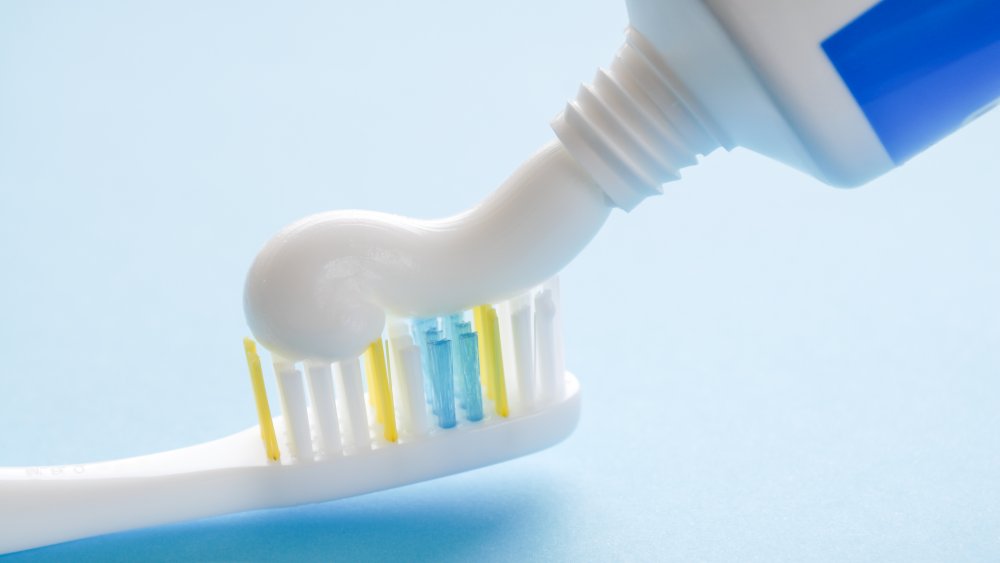
Shutterstock
Certain toothpastes may not exactly be a treat for your teeth. There are many reasons you may not be buying the right one. Even if you purchase a toothpaste with tons of special ingredients, it may not be doing the trick. Whitening toothpastes, for example, may seem like a great idea, but they can actually damage your enamel if you depend on them more than recommended by the label (via Health).
Another thing you should keep in mind is the expiration date. If you find yourself with an old tube of toothpaste, definitely toss it out — especially if it contains triclosan. Research has shown that triclosan can mess with your thyroid and even how your body handles antibiotics when you need them (via Consumer Reports).
Additionally, you’ll want to make sure your toothpaste contains fluoride, according to the American Dental Association. This is the ultimate way to fight tooth decay. To make toothpaste shopping even easier, just look for anything with the ADA seal on the label. That should definitely do the trick.
Failing to rinse your toothbrush immediately after brushing your teeth
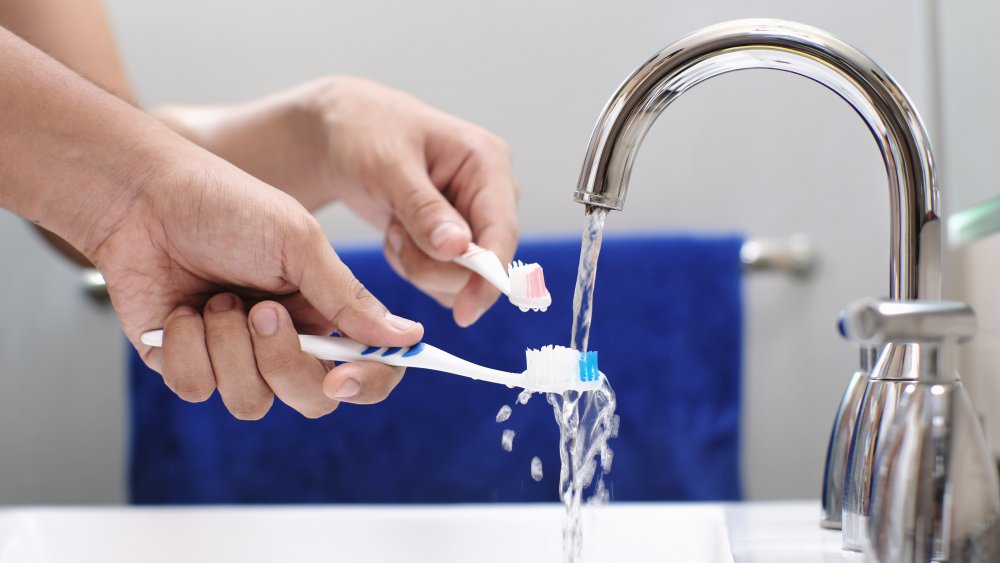
Shutterstock
When the toothbrushing is said and done (you did it!), there’s another step you need to take (wait, what?). Be sure to wash out your toothbrush’s bristles to prevent bacteria from building up. “It is beneficial to rinse your toothbrush with water after each use to minimize the amount of residue and bacteria accumulation,” Beverly Hills-based orthodontist Dr. Nehi Ogbevoen explained in an interview with Aquafresh. It really is as simple as using water — and only water.
Companies everywhere may try to sell you disinfectants — and you may be tempted to buy in. But you should think twice. Luckily, you don’t need them to get the job done. According to the Centers for Disease Control and Prevention, submerging your toothbrush in mouthwash or any other disinfecting solution is completely unnecessary. In fact, doing so can actually increase the amount of germs!
Your bathroom is loaded with bacteria, so it’s important to wash your brush off with water — and wash those hands too. After all, you don’t want the germs from your hands to make their way into your mouth. Eek.
